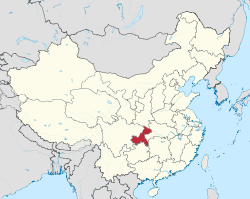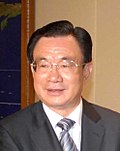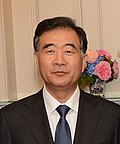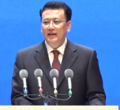Top Qs
Timeline
Chat
Perspective
Politics of Chongqing
From Wikipedia, the free encyclopedia
Remove ads
The politics of Chongqing is structured in a dual party-government system like all other governing institutions in the People's Republic of China (PRC).
The mayor of Chongqing is the highest-ranking official in the People's Government of Chongqing. As since 1997 Chongqing has been a centrally administered municipality, the mayor occupies the same level in the order of precedence as provincial governors. However, in the city's dual party-government governing system, the mayor has less power than the Chongqing Chinese Communist Party Municipal Committee Secretary, colloquially termed the "Chongqing CCP Party Chief".
Since 1997, the Chongqing Municipal People's Congress has governed Chongqing.[1] Chongqing was previously also governed by a municipal government between 1939 and 1954, but in 1929–1939 and 1954–1997, when Chongqing was a sub-provincial city rather than a centrally administered municipality, it was governed by the Chongqing City Government.[citation needed]
Remove ads
Chongqing model
Summarize
Perspective
The "Chongqing model" was a series of social and economic policies adopted in the Chinese megalopolis of Chongqing. It is most closely associated with Bo Xilai, who served as the city's Communist Party secretary from 2007 to 2012, though some policies were put in place by Bo's predecessors.
The Chongqing model was characterized in part by increased state control and the promotion of a neo-leftist ideology. It involved a sweeping and sometimes extrajudicial campaign against organized crime, and increased the security and police presence in the city. As a means of addressing declining public morality, Bo launched a "red culture" movement to promote Maoist-era socialist ethics. On the economic front, he actively courted foreign investment and focused on manufacturing for domestic consumption. The Chongqing model was also characterized by massive public works programs, subsidized housing for the poor, and social policies intended to make it easier for rural citizens to move to the city.
The Chongqing model represented an alternative model of development which diverged from the policies favored by the reformist faction led by Party general secretary Hu Jintao and Premier Wen Jiabao, as well as the model put by the Guangdong CCP committee secretary Wang Yang. When Bo Xilai was removed from his posts in the spring of 2012, authorities began a campaign to reverse several of the policies that characterized the Chongqing model, including by cracking down on expressions of "red culture". Individuals, who believed they had been wrongly persecuted under the anti-corruption campaign, also began seeking legal redress.Remove ads
List of the CCP Chongqing committee secretaries
Summarize
Perspective
Remove ads
List of mayors of Chongqing
Summarize
Perspective
Remove ads
List of chairmen of Chongqing People's Congress
- Wang Yunlong (王云龙): 1997–2002
- Huang Zhendong (黄镇东): 2003–2005
- Wang Yang (汪洋): 2006–2008
- Chen Guangguo (陈光国): 2008–2011
- Chen Cungen (陈存根): 2011–2012
- Zhang Xuan (张轩): 2012–present
List of chairmen of CPPCC Chongqing Committee
- Zhang Wenbin (张文彬): 1997–2003
- Liu Zhizhong (刘志忠): 2003–2008
- Xing Yuanmin (邢元敏): 2008–2013
- Xu Jingye (徐敬业): 2013–2017
- Xu Songnan (徐松南): 2017–2018
- Wang Jiong (王炯): 2018–2023
- Tang Fangyu (唐方裕): 2023–present
List of chairmen of Chongqing Supervisory Commission
- Chen Yong (陈雍): January 2018–October 2018
- Mu Hongyu (穆红玉): January 2019–December 2021
- Song Yijia (宋依佳): March 2022–present
See also
References
Wikiwand - on
Seamless Wikipedia browsing. On steroids.
Remove ads














